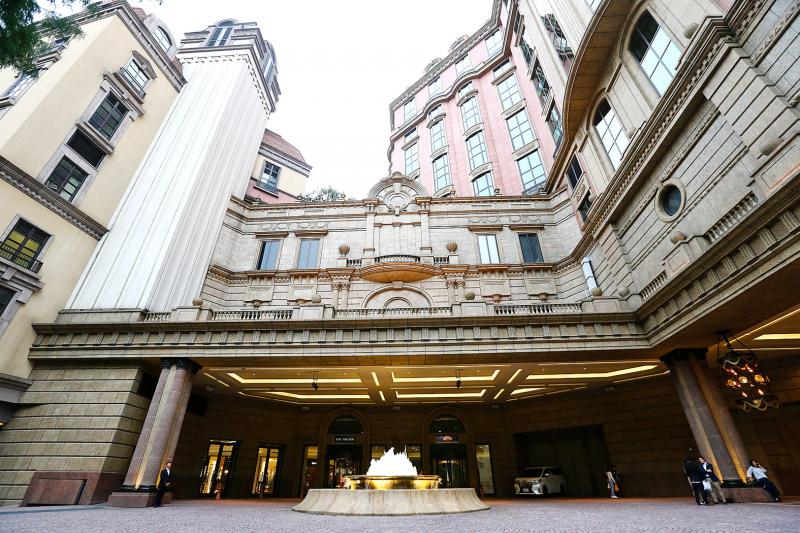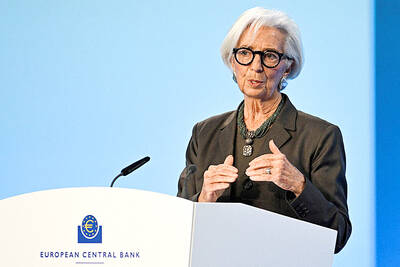Luxury hotel Mandarin Oriental Taipei (文華東方酒店) plans to reopen its guestrooms in December to take advantage of a boom in domestic travel.
The reopening would come six months after the five-star facility suspended room operations to cut costs as countries across the region impose border controls to contain the COVID-19 pandemic, diminishing demand for business travel.
“We are delighted to share that Mandarin Oriental Taipei will resume room operations on December 1,” the hotel said in a statement yesterday.

Photo: Chen Yi-kuan, Taipei Times
The hotel in Songshan District (松山) said it would adopt stringent health and safety practices to ensure the well-being of its guests and employees.
It would unveil promotion packages and other details in the run-up to the reopening, the statement said.
Mandarin Oriental, which operates 33 high-end hotels and seven residences in 23 countries and territories, has reopened its properties in Tokyo, Milan, London, Paris and Munich. It is to welcome back guests in Madrid in March next year.
Business at Mandarin Oriental Taipei’s restaurants, bars and spa, as well as conference and banquet facilities, has almost recovered to pre-pandemic levels after the outbreak was brought under control in Taiwan in May.
Hotels outside Taipei have since seen significant business improvement, as strict border controls and mandatory quarantine abroad have encouraged Taiwanese to go on domestic trips.
Mandarin Oriental Taipei is reopening at the urging of affluent local guests who are longing for luxurious staycation experiences, it said.
The hotel intends to rehire employees it let go in June, local media reported.
The hotel had opted for a partial shutdown, as foreign guests accounted for 80 percent of its clientele.
Occupancy rates remain low in general for lodging facilities in Taipei, with major players planning to offer cutthroat discounts at the annual Taipei International Travel Fair, to be held at the Taipei Nangang Exhibition Center from Friday next week to Nov. 2.
Formosa International Hotels Corp (晶華國際酒店) is to offer room and restaurant vouchers for different packages priced at about 70 to 80 percent off the regular charges to motivate customers, while Cosmos Hotel & Resorts Group (天成飯店集團) is to sell room vouchers at NT$3,699 (US$127.77) each that allow holders to stay for two nights at Cosmos Taipei (台北天成大飯店), the Taipei Garden Hotel (台北花園大酒店) or Hua Shan Din (華山町).
My Humble House Group (寒舍集團) is to offer vouchers that allow guests to stay at the Sheraton Grande Taipei Hotel (台北喜來登大飯店) for one night with free breakfast for two for NT$3,999, or a discount of 70 percent of the original price tag.

European Central Bank (ECB) President Christine Lagarde is expected to step down from her role before her eight-year term ends in October next year, the Financial Times reported. Lagarde wants to leave before the French presidential election in April next year, which would allow French President Emmanuel Macron and German Chancellor Friedrich Merz to find her replacement together, the report said, citing an unidentified person familiar with her thoughts on the matter. It is not clear yet when she might exit, the report said. “President Lagarde is totally focused on her mission and has not taken any decision regarding the end of

French President Emmanuel Macron told a global artificial intelligence (AI) summit in India yesterday he was determined to ensure safe oversight of the fast-evolving technology. The EU has led the way for global regulation with its Artificial Intelligence Act, which was adopted in 2024 and is coming into force in phases. “We are determined to continue to shape the rules of the game... with our allies such as India,” Macron said in New Delhi. “Europe is not blindly focused on regulation — Europe is a space for innovation and investment, but it is a safe space.” The AI Impact Summit is the fourth

CONFUSION: Taiwan, Japan and other big exporters are cautiously monitoring the situation, while analysts said more Trump responses ate likely after his loss in court US trading partners in Asia started weighing fresh uncertainties yesterday after President Donald Trump vowed to impose a new tariff on imports, hours after the Supreme Court struck down many of the sweeping levies he used to launch a global trade war. The court’s ruling invalidated a number of tariffs that the Trump administration had imposed on Asian export powerhouses from China and South Korea to Japan and Taiwan, the world’s largest chip maker and a key player in tech supply chains. Within hours, Trump said he would impose a new 10 percent duty on US imports from all countries starting on

STRATEGIC ALLIANCE: The initiative is aimed at protecting semiconductor supply chain resilience to reduce dependence on China-dominated manufacturing hubs India yesterday joined a US-led initiative to strengthen technology cooperation among strategic allies in a move that underscores the nations’ warming ties after a brief strain over New Delhi’s unabated purchase of discounted Russian oil. The decision aligns India closely with Washington’s efforts to build secure supply chains for semiconductors, advanced manufacturing and critical technologies at a time when geopolitical competition with China is intensifying. It also signals a reset in relations following friction over energy trade and tariffs. Nations that have joined the Pax Silica framework include Japan, South Korea, the UK and Israel. “Pax Silica will be a group of nations